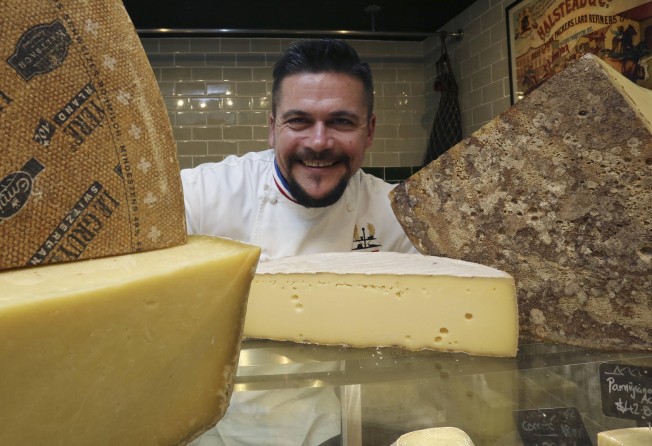
How winning cheese 'Olympics' helped Rodolphe Le Meunier go global
The French cheesemonger, who was in Hong Kong recently, tells Bernice Chan about expanding internationally, how he chooses his cheese and makes sure it is presented just right

How did you get into cheesemaking? "My paternal grandmother was a goat-cheese maker [in the Loire Valley, France] and I made cheese with her when I was five years old. When I was older I helped my father, who was a goat-cheese affineur ['cheese ager'], to package cheeses. And I'm an affineur of whatever cheeses I like."
How do you choose your cheese? "I pick cheese I'd like to eat for breakfast; I can only buy and sell cheese that I love. After that we figure out where I can sell the cheeses. If it is a fragile product, then it's just for the French market. We age the cheese accordingly so that it's just right for my customers. Triple cream cheeses don't travel well, whereas hard cheeses have already been dried so they're ready to go. It takes nearly 10 days to ship from my [cellar] to Hong Kong so we have to take this into consideration so that by the time it arrives here it's at the perfect time to eat. I have to taste the cheese wheel by wheel because some cheeses are made with milk from different producers, so they can vary."
How did you prepare for the "world's best cheesemonger" contest? "There are many parts to winning the contest [at the International Caseus Awards]. One is a written test, then a cutting test and then there's a blind tasting of five or six cheeses. Finally, there are displays you have to prepare, like a cheeseboard, for a buffet, and even cheese cooking.
"My first attempt was in 2004 and I lost, so for the next three years I prepared every day because I wanted to win the contest so badly. In my shop I would cut cheese for customers as if it was the competition. I focused as if I was training for the Olympics. It's an eight-hour contest so it's very intense. When I won [in 2007] and stood on the podium, they played La Marseillaise and I was very emotional.
"The same year I also won the Meilleur Ouvrier de France - the best artisan award - for cheese, a lifetime title given by the French government. That's why my chef's jacket can have a collar that has the colours of the French flag.
"The [Caseus] contest is held about every 3½ years. I lost the first time because the jury is more conservative and I did a presentation that was a bit too modern for them to accept. I was so angry when I lost. I was competing against people who were quite well known because it's a small circle."

Tell us how the award changed your life. "Winning the contest was the key that opened doors for me. I didn't want to be like my father, putting cheeses in boxes for 20 years. I wanted to do something with my life, do things differently, I wanted to get my reputation at 30 years old, not 60. I didn't want to make the same cheese in the same style every day. I wanted to expand my market and travel. I met a Japanese importer at a cheese show and started going [to Japan] and selling French cheeses. That's how I managed to get into the American and Australian markets, too. When I find distributors, I see how they handle my cheeses. I put so much care into making the cheese that if they are not properly stored in the shops then it would all be wasted."
Do different countries like different cheeses? "If you give them a good cheese, everyone likes it. When I visit Japan, I go to elementary schools where the kids are six to 10 years old. I show them a map of France, explain what cheese is and then I give them some to try and they like it.
"My son, Theodore, is six years old and he loves cheese. He likes comte and creamy cheeses. So I created a line called Petit Theodore. It's a triple cream cheese, one with raisins and sugarcane, so it's creamy and strong like him. Another is speculoos and blueberry, another is raspberry and pistachio. Unfortunately, I can't bring them to Hong Kong because they are too creamy and delicate to travel such a long distance."
What do you like to do when you're not thinking about cheese? "I enjoy travel, playing the piano, guitar, a bit of trumpet. If I wasn't a cheesemonger I would have been a rock 'n' roll pianist. I also like to [play] golf - my handicap is nine.
Rodolphe Le Meunier's cheeses are available at Feather & Bone, 18 Gage Street, Central, tel: 2325 8570.